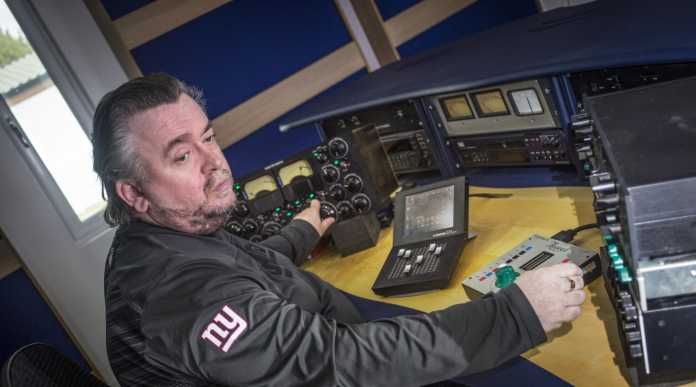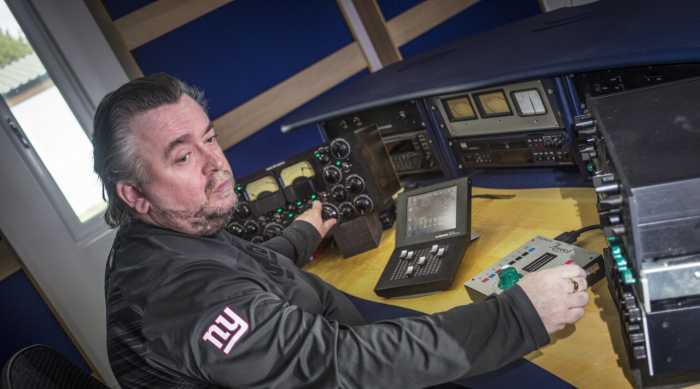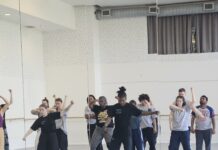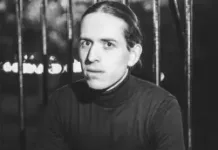
THIS year the founder of Wav Mastering, a mastering studio based in Limerick, is celebrating 30 years in the music industry.

His editing or mastering work can be heard on releases from dance acts Groove Armada, Deep Dish and Robert Miles, and from a host of pop acts that topped the charts. 2 Unlimited, S Club 7 and Five are just some.
Richard moved back to Limerick ten years ago and opened his mastering studio.
In the last decade the studio has mastered two Choice Music Prize winning albums (‘Jape’ and ‘Soak’) and 1000s of Irish and international acts. Declan O’Rourke, Christy Moore, Beoga, Hermitage Green, Clannad, Rubberbandits (‘Dad’s Best Friend’ on Trainspotting sequel), The Undertones, Villagers are just a few that have been mastered at the Limerick studio.
For the uninitiated, Mastering is the final process in music recording, the part that gives a single or album the standout punch, immediacy and balance for radio play and for general release.
Chatting to Limerick Post in his studios this week, Richard explained the process.
“You record a song, you mix a song, then you master it for release.”
Looking back over 30 years in the industry, Richard recognises the huge changes in the music business.
It was important to be based in London in the early days. The record companies were there, the studios were there and recordings on disc or tape would be hand delivered to the studios for mastering. Today these files can be sent online and location is not an issue. Richard worked at PRT Studios (formerly PYE) in Marble Arch in the late ’80s, which was bought out by Pete Waterman (of Stock, Aitken and Waterman fame) in 1990. In the following years Richard would work on some of pop’s biggest hits for the major labels.
“I started as a tape op, runner, assistant engineer, then assistant mastering engineer and then a mastering engineer.”
As assistant engineer Richard worked on Motorhead’s live album ‘No Sleep at All’, a follow up to ‘No Sleep ’til Hammersmith’.
The album was almost entirely re-recorded by the band in the studio (a common practice for “live” albums – to get a polished finished product).
Richard remembers the legendary Lemmy Kilminster as a “gentleman – a really nice bloke – great conversationalist – just a top lad.”
Richard worked with an impressive list of dance acts in the 90s creating radio edits from club mixes and compiling Ministry of Sound albums.
Groove Armada ~ Superstylin’, Robert Miles ~ Children, Atlantic Ocean ~ Waterfall, Opus III ~ It’s a Fine Day and Felix ~ Don’t You Want Me all have Dowling’s name on the credits.
Richard’s editing skills were used for a huge hit from 90s’ dance pop legends 2 Unlimited.
The Dutch duo of rapper Ray Slijngaard and vocalist (and full time traffic warden) Anita Doth fronted the project called 2 Unlimited for Belgian producers Jean-Paul DeCoster and Phil Wilde.
Preparing a lead single from their second LP, Richard cut up the album track ‘No Limits’, shortening it and dropping the rap section – a disappointment for Slijngaard.
“It needed to be shortened for radio. We made a decision to dramatically change it by not having the rapping verses in it and changing it to three core elements which were the keyboard riff, the main chorus riff (‘No-No…No-No-No-No’) and the key change bridge.
“Making whole song out of those three elements – we took a record and turned it into something else.”
‘No Limits’ became 2 Unlimited’s most successful single ever and by far their best remembered hit today.
In the Mastering Studio of PWL Studios, Richard seldom met the pop stars that he worked on. He consulted with the likes of Simon Cowell and Simon Fuller, who created S Club 7 and Louis Walsh who managed Boyzone and Westlife.
“I don’t work with the artists, I work with the label. You would never see a pop star turn up in my studio. But Gary Barlow did turn up one day, for an edit of ‘Never Forget’. That is probably the only pop star who was ever in that room.
He did get to know the members of Westlife though.
“Westlife started off at PWL. I got to know them. They would play football out in the carpark of the studio when they were young.”
Richard would regularly be distracted by a football smacking off the door of his studio.
“Outside would be McFadden, playing f*cking GAA again,” he laughs.
While the mastering studio might not be the place to hunt for a pop star’s autograph. It is the place where you get to hear music first – after the recording process.
Richard was inspired to get into studio engineering because first and foremost – he loves music.
“I wanted to get into the music business because I was a music fan and I bought records. That is what drove me to this in the first place.
“Then I discovered how it was done. I was always in the cutting room. I was always hearing new music first because you getting the promos and acetates.”
From the heady days of huge CD sales in the 1980s to the era of Napster when music was being shared for free, to today’s streaming services, the music business very nearly disappeared altogether. Is it a viable business today?
“There is still a music business. They are still making money. They wouldn’t be doing it if they weren’t.
Today it is the music “business” that has survived. As opposed to the music “industry” which is certainly not the huge employer it one was.
“In my day it was an industry!”
“In the period I went through, it was all about the blagging, the partying, the gigs. It doesn’t have that any more. The majors have shrunk into three companies now.”
The industry may have shrunk, but there is still a need for music and there is still a need for new music.
“Music is all around you! Every advert you hear! Music is everywhere!
“There is more competition for kids’ time these days. But two or three people may get in a room today, make a sound and may be the next Cranberries!”










